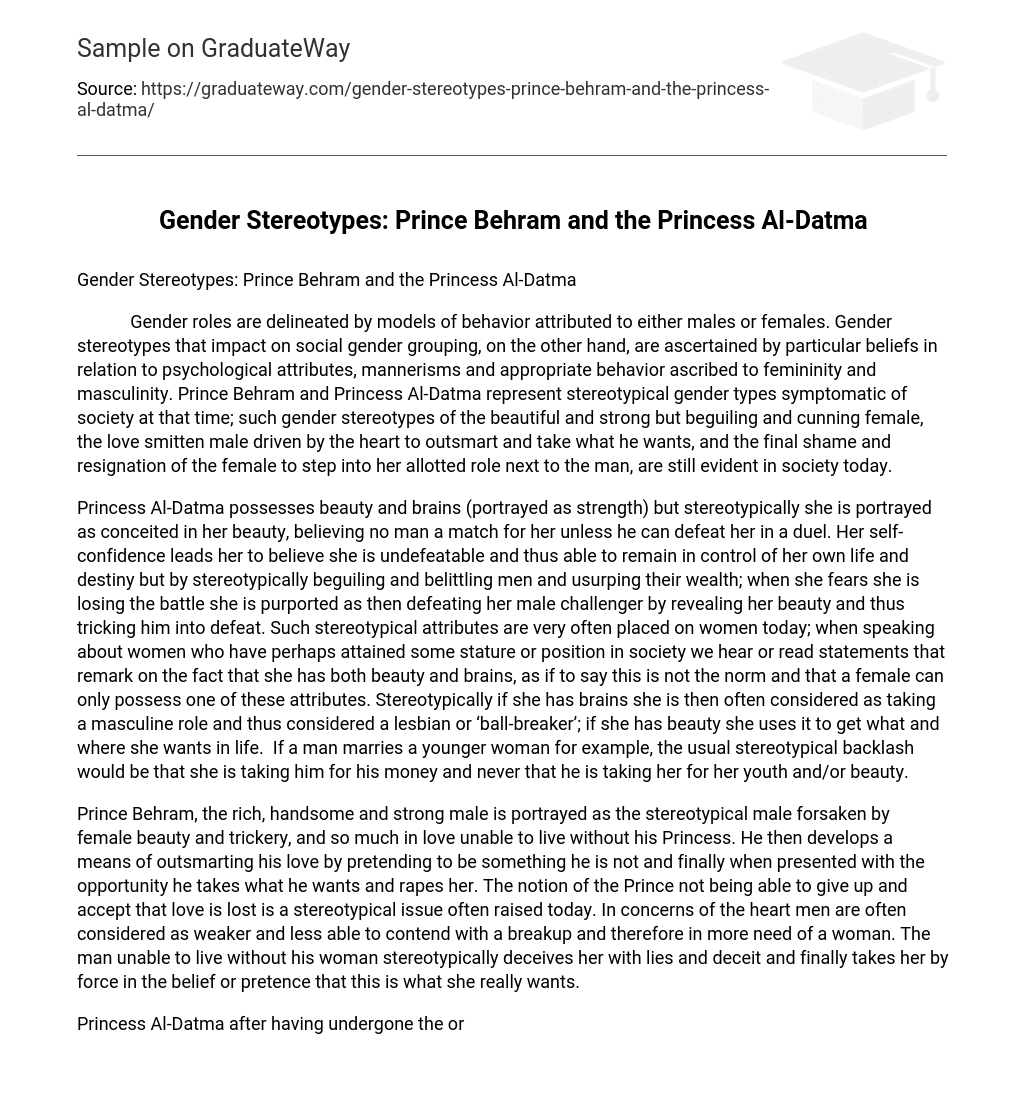Gender roles are delineated by models of behavior attributed to either males or females. Gender stereotypes that impact on social gender grouping, on the other hand, are ascertained by particular beliefs in relation to psychological attributes, mannerisms and appropriate behavior ascribed to femininity and masculinity.
Prince Behram and Princess Al-Datma represent stereotypical gender types symptomatic of society at that time; such gender stereotypes of the beautiful and strong but beguiling and cunning female, the love smitten male driven by the heart to outsmart and take what he wants, and the final shame and resignation of the female to step into her allotted role next to the man, are still evident in society today.
Princess Al-Datma possesses beauty and brains (portrayed as strength) but stereotypically she is portrayed as conceited in her beauty, believing no man a match for her unless he can defeat her in a duel. Her self-confidence leads her to believe she is undefeatable and thus able to remain in control of her own life and destiny but by stereotypically beguiling and belittling men and usurping their wealth; when she fears she is losing the battle she is purported as then defeating her male challenger by revealing her beauty and thus tricking him into defeat.
Such stereotypical attributes are very often placed on women today; when speaking about women who have perhaps attained some stature or position in society we hear or read statements that remark on the fact that she has both beauty and brains, as if to say this is not the norm and that a female can only possess one of these attributes. Stereotypically if she has brains she is then often considered as taking a masculine role and thus considered a lesbian or ‘ball-breaker’; if she has beauty she uses it to get what and where she wants in life. If a man marries a younger woman for example, the usual stereotypical backlash would be that she is taking him for his money and never that he is taking her for her youth and/or beauty.
Prince Behram, the rich, handsome and strong male is portrayed as the stereotypical male forsaken by female beauty and trickery, and so much in love unable to live without his Princess. He then develops a means of outsmarting his love by pretending to be something he is not and finally when presented with the opportunity he takes what he wants and rapes her.
The notion of the Prince not being able to give up and accept that love is lost is a stereotypical issue often raised today. In concerns of the heart men are often considered as weaker and less able to contend with a breakup and therefore in more need of a woman. The man unable to live without his woman stereotypically deceives her with lies and deceit and finally takes her by force in the belief or pretence that this is what she really wants.
Princess Al-Datma after having undergone the ordeal of rape feels shame and humiliation and rather than face the public she opts to go with the Prince to his land and leave all she loves behind. Although many women today make their own choices in life there remains the idea of a stereotypical woman who should, at whatever odds, stand by her man. This may mean giving up everything she holds important in life, including career, friends and family, to go with him to where his future lies – not hers.
Stereotypically, in today’s society, the reason many mistreated women stay with the man, is because in some way they like to be treated this way; in reality however, it is often because they are too afraid or ashamed to make the issue public, fearing unjust backlash, public slurring and legal retribution.
The gender stereotypes depicted by Prince Behram and Princess Al-Datma convey many of the stereotypical beliefs held today and what is apparent is that such gender stereotypes based on social beliefs and values of what characteristics are attributed to men and women are seemingly distorted and more detrimental than beneficial.





